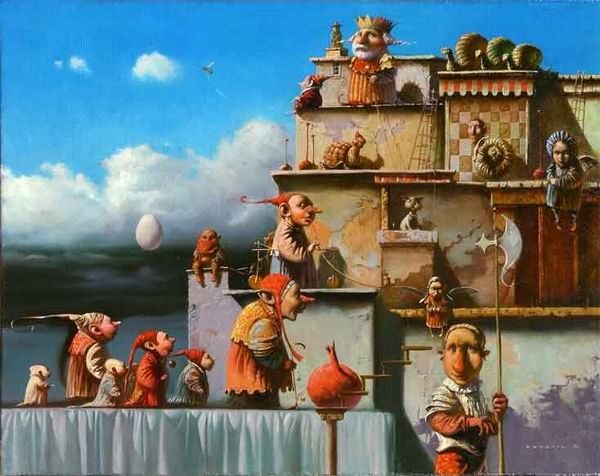
Chess Improvement: Find Key to an Essential Competence
Chess players suffer from many diseases. One of the most common and serious is a poor exploiting advantage technique. Almost all players, including strong ones, and sometimes even champions, struggle with this technique ("...in many games, I was not able to convert my advantages into a win," Mikhail Botvinnik, in The Method for Preparing for Competition)
Real chess strength lies in the virtuosity of your technique to convert the material and/or positional advantages of those "won" positions to success (GM Tartakower)
This divine capacity precisely underscores the simplicity of truth in chess!
It is impossible to attain true chess mastery without objective evaluation of position and capacity to press home the accumulated advantage. Lack of it may slow down, and even block the improvement of developing players.
GM Tolush (in his "Success of Young Players" article) expressed the view that the main deficiency in the game of the young, talented Boris Spassky was the "weak technique of the realization of advantage." Of course, the "disease" was soon successfully eradicated from the game of the future tenth World Chess Champion.
This post is intended to get you interested in the subject and make you start working on improving this essential chess mastery. Ultimately, it will make you a better, much better chess player (Craig Clawitter @NMChessToImpress recently wrote an interesting article on the theme).
Realization of advantage is one of the most useful topics to work on if you want to make substantial improvements and then display it in your game (you can read about my "improvement philosophy" and an effective method to genuinely upgrade your chess skills at the end of the text).
 Elizabeth Ingham-Smith, An Unfair Advantage
Elizabeth Ingham-Smith, An Unfair Advantage
Here are two examples of exploiting advantage by transitioning into endgame (I intentionally picked two endgames to drive you away for a little while from unproductive waste of your time and effort spent in studying openings, openings, and then some more openings — I am afraid, too much overspending on openings is seriously hindering your chess potential).
If you haven't been able to exploit an advantage in the midgame, the shortest path to success is reasonable trades and switching into an endgame. Trade the active enemy pieces to suppress counterplay. Get into endgame if it doesn't cause doubts and difficulties in realization. Else, it's simpler to stay in the midgame and seek to exploit your advantage there.
 "Since I began playing tournament games I haven't avoided transition to an endgame as I mastered the advantage realization technique. I didn't want to complicate position and strive for effects. I played, as they say, "according to position."—Vasya Smyslov
"Since I began playing tournament games I haven't avoided transition to an endgame as I mastered the advantage realization technique. I didn't want to complicate position and strive for effects. I played, as they say, "according to position."—Vasya Smyslov

Hope these two examples were enjoyable to work through. If you possibly got curious about the subject and fatally![]() attracted to it, the much better (below you can find even more key areas for improvement).
attracted to it, the much better (below you can find even more key areas for improvement).
Yours truly,

ROARING PAWN'S RECIPE FOR YOUR GAME IMPROVEMENT
1) Pick one of the important chess topics below that you feel, or have been advised by a coach, that you should get better at,
2) Use deliberate practice (see Anders Ericsson, Peak: Secrets from the New Science of Expertise) with the right method to grow your knowledge and understanding of the subject matter using all available resources, coaches, books, videos, online content, etc.,
3) Make your brain saturated with the subject (see Arthur Koestler, The Art of Creation) which means until it gets deep into the subconscious and becomes automatic as part of your chess skills toolbox,
GOTO #1 and loop thru ##1-2-3 as many times as needed.
(Jeez, Roarie, frankly, do we have to go through all this and even practice coding by using the loop command and goto statement? I hear you saying![]() )
)
 Artist Farit, The debate on the topic
Artist Farit, The debate on the topic
Topics to consider? They should be the most conducive to creating a more effective and efficient thought process. Here are some suggestions (again, stop wasting time on too much openings, it's an impasse),
- Absorb to always look for targets
- Identify/create/exploit weak/strong points
- Get to know Pawn play inside out
- Sharpen "small tactics" for positional gains
- Learn the art of trading pieces
- Achieve and maintain initiative
- Seek the most forcing moves
- Acquire a good advantage realization technique
- Discover what matters most (it is so-called CoG, Schwerpunkt, the term borrowed from the Prussian strategist Karl von Clausewitz — and this is a real biggie),
etc.
As you may have noticed, the list consists of some higher-level ideas. The good thing is, while studying these complex top-level concepts you will pick up on many basic ones, too!
.
.

